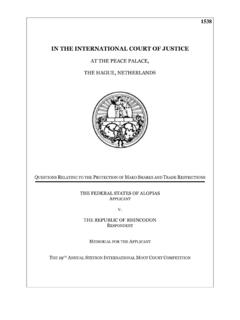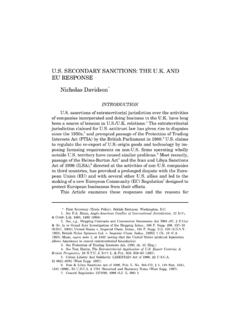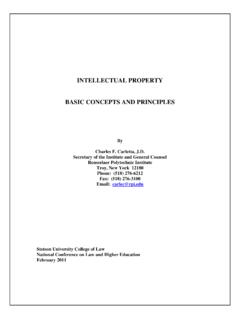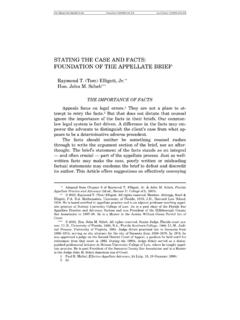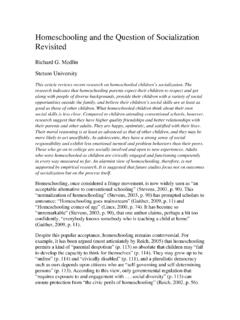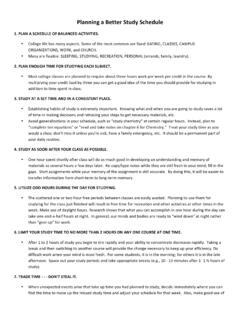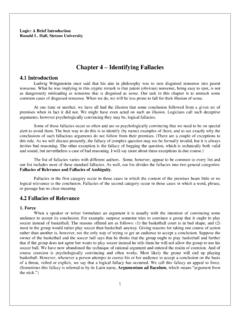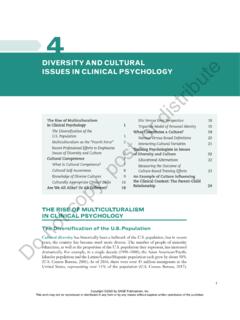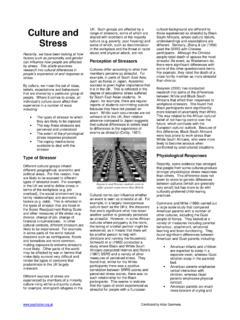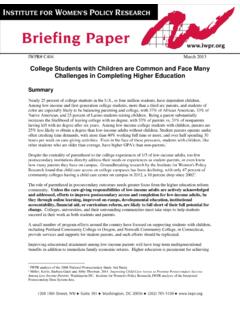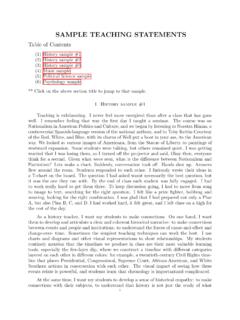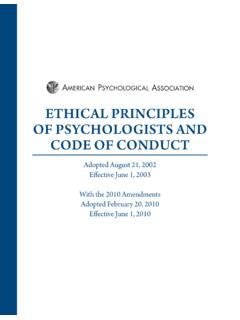Transcription of Homeschooled Children’s Social Skills - Stetson University
1 1 Homeschooled Children s Social Skills Richard G. Medlin Stetson University 2 Homeschooled Children s Social Skills There is a striking irony surrounding homeschooling perfect strangers seem far more worried about Homeschooled children s Social development than their own parents do. For example, a survey of public school superintendents found that 92% believed Homeschooled children do not receive adequate socialization experiences (Mayberry, Knowles, Ray & Marlow, 1995). Their parents have real emotional problems themselves, one superintendent asserted, and need to realize the serious harm they are doing to their children in the long run, educationally and socially (p. 94). Educational psychologists representing the american Psychological Association published their opinions about homeschooling in the APA Monitor (Murray, 1996). These psychologists warned parents that their children may experience difficulty entering mainstream life and may not grow up to be complete people if taught at home.
2 And a study of parents whose children attended public schools reported that 61% believed Homeschooled children were isolated (Gray, 1993). One participant described the majority of Homeschooled children as socially handicapped (p. 10). In stark contrast to this widespread pessimism and alarm, homeschooling parents are simply not particularly worried about socialization (Medlin, 2000, p. 110). They tend to be confident that their children are receiving adequate socialization experiences and that their children s Social development is coming along quite nicely (Pitman & Smith, 1991; Reynolds, 1985; Tillman, 1995; Wartes, 1987). With such dramatic differences of opinion and with so much apparently at stake for Homeschooled children it is crucial to know who is right. Are homeschooling parents deceiving themselves and crippling their children s Social development? Or are the forebodings of others perhaps no more than expressions of ignorance, prejudice, and self interest?
3 Review of the Research 3 Research affirms that although homeschooling parents are not worried about their children s Social development, they do care about it. In fact, they are strongly committed to providing positive socialization experiences for their children (Gray, 1993; Gustafson, 1988; Howell, 1989; Martin, 1997; Mayberry, 1989; Mayberry et al., 1995; Van Galen, 1987; Van Galen & Pitman, 1991). They believe, however, that socialization is best achieved in an age-integrated setting under the auspices of the family (Tillman, 1995, p. 5), rather than in a conventional school with its unnatural age segregation (Smedley, 1992, p. 13) and institutional culture. Consequently, they make sure that their children regularly take part in a variety of Social activities (Delahooke, 1986; Rakestraw, 1988; Ray, 1990, 1997, 2000, 2003; Rudner, 1999; Wartes, 1988, 1990). These activities are purposefully chosen to help children develop leadership abilities and Social Skills in a positive, affirming environment (Johnson, 1991; Montgomery; 1989).
4 The perception of Homeschooled students as being isolated, uninvolved, and protected from peer contact, therefore, is simply not supported by the data (Montgomery, 1989, p. 9). Nevertheless, the Social world of Homeschooled children is not the same as that of children attending conventional schools (Chatham-Carpenter, 1994). How does this difference affect the development of Social Skills ? Social behavior in Homeschooled children has been studied from three different points of view from the perspectives of parents, objective observers, and the children themselves. For example, Stough (1992) and Smedley (1992) had parents of Homeschooled children and parents of children attending traditional schools complete the Vineland Adaptive Behavior Scales (Sparrow, Balla, & Cicchetti, 1984), a widely used measure of Social development. While Stough found no significant differences between the groups, Smedley found that Homeschooled children received higher scores on the communication, daily living Skills , socialization, and Social maturity subscales of the test.
5 In a similar study (Lee, 1994), homeschooling parents rated their children higher 4 than did the parents of conventionally schooled children on the Adaptive Behavior Inventory for Children (Mercer & Lewis, 1977). Francis (1999) matched homeschool children to public school children, and asked their parents to complete the Parent Form of the Social Skills Rating System (Gresham & Elliott, 1990). This version of the test measures cooperation, assertiveness, responsibility, self-control, problem behaviors, and also yields a total Social Skills score. Although Homeschooled children received higher scores on all the Social Skills subscales, and lower scores on the problem behavior subscale, only the self-control and total scores were significantly different. In one of the most methodologically astute studies of Homeschooled children, Shyers (1992a, 1992b) carefully matched Homeschooled children to children attending traditional schools. Naive observers then watched small groups of the children playing or working together to solve puzzles.
6 The results were striking children attending conventional schools showed more than eight times more problem behaviors than Homeschooled children. Shyers described the traditionally schooled children as aggressive, loud, and competitive (1992b, p. 6). In contrast, the Homeschooled children acted in friendly, positive ways. He noted that they introduced themselves, initiated conversation, cooperated with others, invited uninvolved children to join them in play, took turns, let others know it was alright if they lost a game, and even exchanged addresses and phone numbers for future contact (Shyers, 1992b, p. 194). Galloway (Galloway, 1998; Galloway & Sutton, 1997) used objective records to compare college students who had been Homeschooled in high school to those who had attended public or private high schools. She evaluated the students on more than 60 indicators of college performance grouped into five categories: academic, cognitive, Social , spiritual, and psychomotor.
7 For example, academic indicators included measures such as grade point average and class rank. Homeschooled students led the others by a large margin in every category except psychomotor Skills . Since many of 5 these indicators involved positions of leadership, Galloway concluded that Homeschooled students were readily recognized for their leadership abilities. In fact, her results were so one-sided that she felt justified in making a rather provocative statement: I don t ever want to hear again that Homeschooled children are socially inept (Galloway, 1998). Research from the perspective of Homeschooled children themselves is rare, and few of these studies have examined genuine Social Skills . Most self-report studies have measured self esteem (Hedin, 1991; Kitchen, 1991; Kelley, 1991; Lee, 1994; Medlin, 1993, 1994; Shyers, 1992a, 1992b; Stough, 1992; Taylor, 1986; Tillman, 1995). McEntire (in press) found that Homeschooled children engaged in fewer antisocial and self-destructive behaviors than a matched group of public school students.
8 Ray (2003) studied adults who were Homeschooled as children and reported that they are more involved in civic affairs and less likely to be convicted of a crime than the general population (see also Knowles & Muchmore, 1995; Ray, 1997; Webb, 1990). Montgomery (1989) interviewed Homeschooled adolescents and concluded that homeschooling helped them develop leadership Skills . In the study described earlier, Shyers (1992a, 1992b) also tested assertiveness, but did not find a significant difference between Homeschooled children and children attending conventional schools. Kingston & Medlin (in press) reported that Homeschooled children described themselves as more altruistic than public school children did. In conclusion, the available studies show either no difference between Homeschooled children and other children, or a difference favoring Homeschooled children. They suggest that Homeschooled children s Social Skills are certainly no worse than those of children attending conventional schools, and are probably better (Medlin, 2000, p.)
9 116). The available studies, however, are few and often not focused on specific Social Skills . More research, especially from the perspectives of objective observers and of Homeschooled children themselves, is clearly needed. 6 The Present Research The purpose of this study was to examine Social Skills in Homeschooled children from their own point of view. There is a danger, of course, in asking children to evaluate their own behavior. They are likely to lack the objectivity and sophistication of parents or other adult observers. However, they experience the Social exchanges in which they participate with an intimacy and immediacy that no outside observer can. And they judge the success or failure of those exchanges according to criteria that adults may not even be aware of. Without this perspective, therefore, children s Social Skills cannot be fully understood. It was hypothesized that Homeschooled children s scores on a self-report test of four key Social Skills cooperation, assertiveness, empathy, and self-control would be higher than those of the public school children who formed the standardization sample for the test.
10 This difference was expected to become increasingly obvious as grade level increased. Among the Homeschooled children, girls were expected to have better Social Skills than boys. Method Participants Homeschool Group. Seventy Homeschooled children 32 boys and 38 girls in grades 3 through 6 participated in this research. Table 1 shows the number of boys and girls in each grade with their mean ages. All these children were White. Participants were volunteers from two homeschool support groups. Both groups were explicitly Christian, and both were located in the same community in Central Florida. As children provided the data for this study, demographic information about their families other than ethnic background was not recorded. Previous research on this population, however, has indicated that these homeschoolers tend to be Protestant, are more highly educated than the general population, and have a family income slightly higher than the median four-person family income for the state of Florida as a whole 7 (Kingston & Medlin, in press; United States Census Bureau, 2004).
